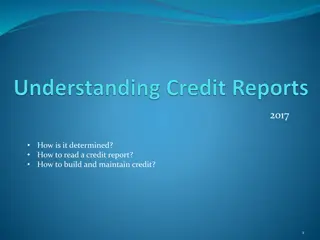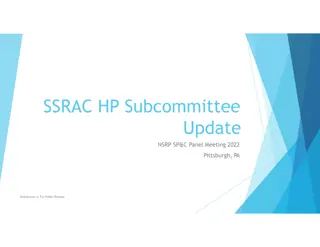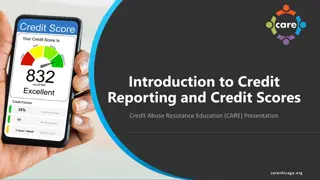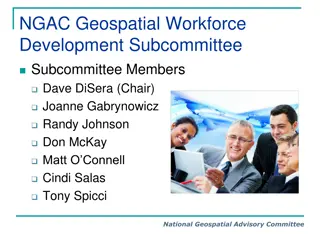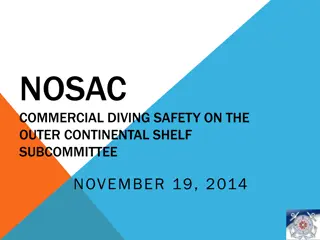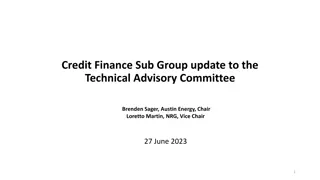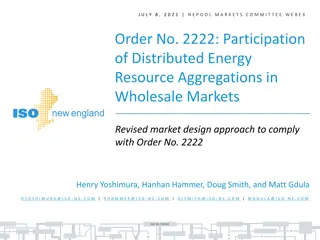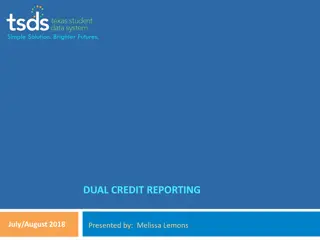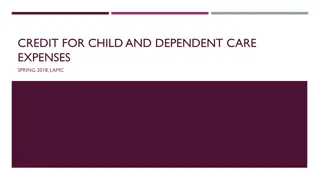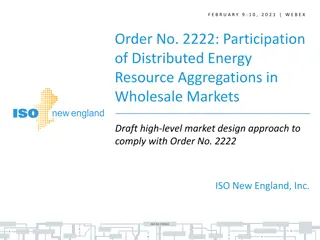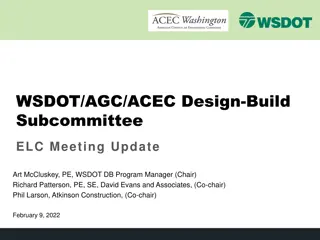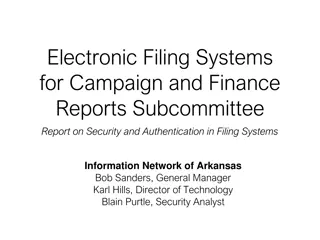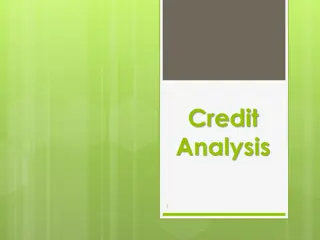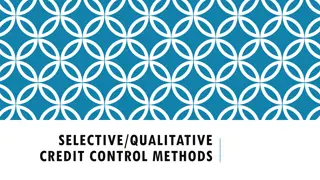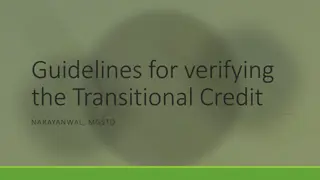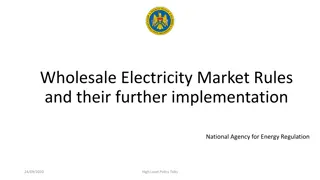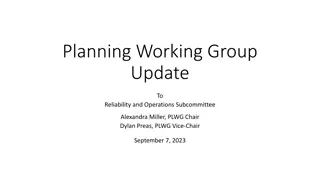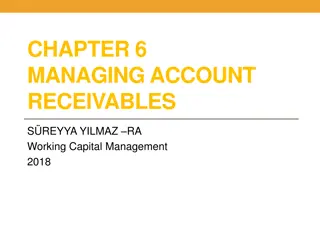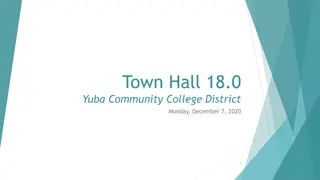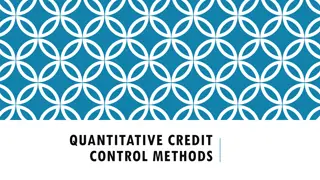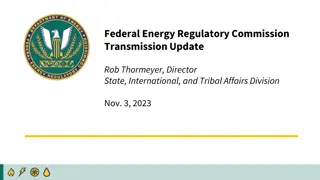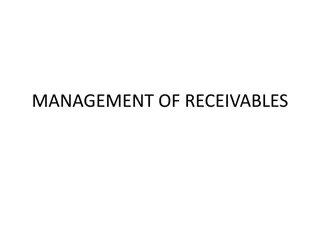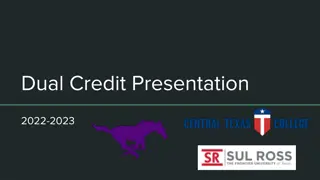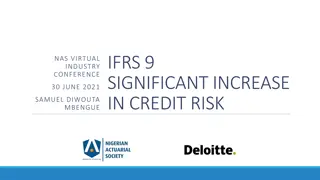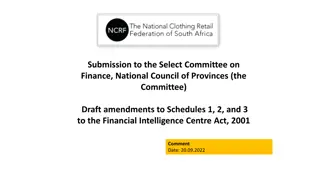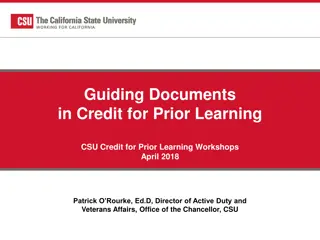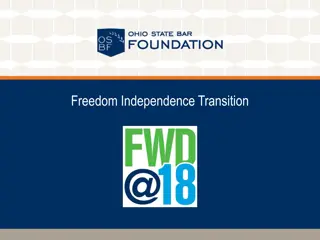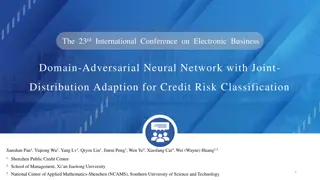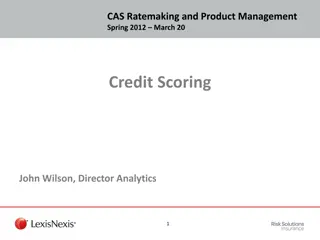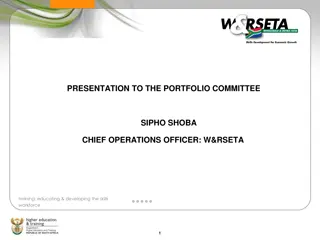Market Credit Working Group Updates to Wholesale Market Subcommittee
The Market Credit Working Group provided updates on various topics, including NPRRs reviewed for credit impacts, late payment enforcement provisions, and a software error identified in ERCOT's Credit Monitoring and Management System. Key discussions revolved around potential conflicts, proposed enforcement provisions, and software fixes to align calculations. The group addressed issues and proposed solutions to enhance efficiency and accuracy in market operations.
Download Presentation

Please find below an Image/Link to download the presentation.
The content on the website is provided AS IS for your information and personal use only. It may not be sold, licensed, or shared on other websites without obtaining consent from the author. Download presentation by click this link. If you encounter any issues during the download, it is possible that the publisher has removed the file from their server.
E N D
Presentation Transcript
Market Credit Working Group update to the Wholesale Market Subcommittee Bill Barnes, NRG, Chair Josephine Wan, Austin Energy, Vice Chair 7/08/2020 1
MCWG update to WMS General Update June 17 Joint MCWG/CWG WEBEX Meeting 6 NPRRs reviewed for their credit impacts (email vote) o 984NPRR Change ERS Standard Contract Terms No Credit Impact o 996NPRR Alignment of Hub Bus Names Between Protocols and ERCOT Model No Credit Impact o 1002NPRR BESTF-5 Energy Storage Resource Single Model Registration and Charging Restrictions in Emergency Conditions No Credit Impact o 1003NPRR Elimination of References to Resource Asset Registration Form No Credit Impact o 1004NPRR Load Distribution Factor Process Update No Credit Impact o 1016NPRR Clarify Requirements for Distribution Generation Resources (DGRs) and Distribution Energy Storage Resources (DESRs) No Credit Impact 2
MCWG update to WMS Late Payment Enforcement Provisions The potential conflict with the SFA could be addressed by: Removing the termination option for Level III Enforcement Providing graduated penalties for Level III Enforcement This also eliminates the do nothing option for the first late payment. ERCOT staff incorporating this feedback into NPRR to be filed soon. Late Pmt. Existing Enforcement Provisions Proposed Enforcement Provisions 1 Review, or Level I Enforcement Increase to or provide 110% collateral for min. 60 days Level I Enforcement Increase to or provide 110% collateral for min. 60 days 2 Level I Enforcement, or Level II Enforcement 110% collateral in cash or LC for 60 days Level II Enforcement 115% collateral in cash or LC for 60 days 3 Level II Enforcement, or Level III Enforcement Warning or terminate SFA Level III Enforcement 120% collateral in cash for 90 days 4 Terminate SFA Terminate SFA 3
MCWG update to WMS Software Error Identified in ERCOT s Credit Monitoring and Management (CMM) System ERCOT identified a software error in its CMM system that occurred with the implementation of Nodal Protocol Revision Request (NPRR) 347, Single Daily Settlement Invoice and Updates to Credit Calculations, including addition of a Minimum Collateral Exposure Component, on November 9, 2012. ERCOT implemented a software fix on June 4, 2020 to align the Total Potential Exposure (TPE) calculation with NPRR347. ERCOT has determined that the 110% and 90% adjustments to RTL have not been included in the RTLF calculation since the implementation of NPRR347. In addition, the 150% RTLF adjustment has not been applied to two RTL components: Real-Time Congestion payments/charges for Self-Schedules Payments/charges for Point-To-Point (PTP) Obligations settled in Real-Time. Because RTL can represent charges or credits, the impact of the errors on RTLF can be either positive or negative. 4
MCWG update to WMS Software Error Identified in ERCOT s Credit Monitoring and Management (CMM) System Therefore, the error may have increased TPE in cases where it incorrectly caused RTLF to exceed the maximum of RTLE (with RFAF applied), and decreased TPE when the opposite occurred resulting in more or less collateral being posted with ERCOT than would otherwise have been the case. Due to system limitations, ERCOT is unable to quantify the number of instances where an erroneous RTLF determined the TPE for a Counter- Party since the implementation of NPRR347. However, since January 2019, ERCOT estimates that on most days: The total aggregate RTLF, if corrected, would have exceeded the erroneously computed RTLF. The maximum of RTLE (with RFAF applied) would likely have exceeded the corrected RTLF on all but one day, indicating that the error impacting RTLF was likely not a material driver of total TPE since January 2019. 5
MCWG update to WMS Settlement Timeline Discussion CWG/MCWG was exploring the possibility to shortening the ERCOT settlement timeline from OD+5 to OD+X. Data streams and ERCOT processes were reviewed at a June 2 2020 workshop. The risk of using estimated and/or inaccurate meter data increases substantially as the timeline is shortened. Counterproductive to credit metrics. ERCOT data validation processes are also squeezed. ERCOT analysis shows limited benefit in reducing collateral requirements of shortening the timeline except to OD+1 which is unworkable. 6
MCWG update to WMS Counter-Party Credit Risk Assessment Market Entry Credit Impacts Credit Assessment Scoring Models Introduction Next Steps The May 13, 2020 workshop Proposed Qualifications and Requirements for Market Entry and Continued Participation by ERCOT Counter-Parties introduced a number of proposals affecting ERCOT processes for Counter-Party qualification and ongoing credit risk management. The proposals in the initiative are in part lessons learned from the PJM Greenhat default, and are similar to initiatives being undertaken at other ISO/RTOs. 7
MCWG update to WMS Counter-Party Credit Risk Assessment Market Entry Credit Impacts Credit Assessment Scoring Models Introduction Next Steps The purpose of this discussion is to highlight credit impacts, primarily the proposed use of a credit scoring model for Counter- Party credit risk assessment. Because of the complexity of credit risk assessment issues, this phase of the market entry initiative will be addressed in detail at stakeholder meetings and may proceed on a different timeline than other aspects of market entry qualification. The second workshop on Market Entry is scheduled for July 29, 2020. 8
MCWG update to WMS TPE (Credit Exposure) Coverage of Settlements Mar 2019-Apr 2020 9


